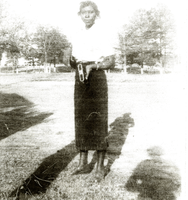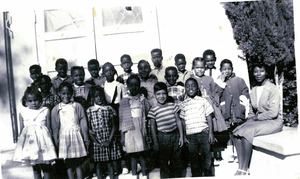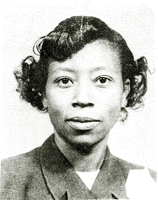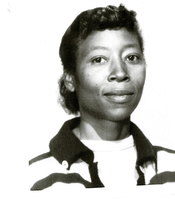Search the Special Collections and Archives Portal
Search Results

Luella Knuckles interview, February 28, 1980: transcript
Date
Archival Collection
Description
On February 28, 1980, Paul Gentle interviewed Luella Knuckles (b. 1910 in Impolla, Texas) about life as an African-American in Las Vegas, Nevada. Knuckles talks to Gentle about the conditions that African-Americans lived in and the discrimination they faced when first arriving to the city. Knuckles, in particular, spends a portion of the interview discussing the segregated layout of Las Vegas and the jobs and opportunities that were available for the black community in a segregated town. Moreover, she provides anecdotes about her deceased husband’s employment, their experience buying and repairing a property by themselves, and the changes in attitudes as the city desegregated. The conversation later focuses on the Church’s place in the African-American community, education and participation in church activities, and Knuckle’s personal love for books and Bible study.
Text

Gene Leavitt interview, February 28, 1979: transcript
Date
Archival Collection
Description
On February 28, 1979, collector Monte Leavitt interviewed Gene Leavitt (born October 6th, 1923 in Mesquite, Nevada) at his home in North Las Vegas, Nevada. In this interview, Mr. Leavitt talks about his career as a truck and bus driver. He also talks about the life in Southern Nevada, the soldiers stationed here, and gambling.
Text

Transcript of interview with Michael Tell by Barbara Tabach, January 6, 2018
Date
Archival Collection
Description
Michael Tell, the youngest son of Jack and Beatrice Tell, is the publisher of the Las Vegas Israelite newspaper and the second generation of ownership. He briefly traces his Jewish ancestral roots back to Eastern European grandparents who settled in New Jersey and New York. He became a bar mitzvah in a conservative Jewish synagogue in New York City. At age sixteen, he accompanied his father, Jack Tell, westward to Nevada. The elder Tell was in pursuit of owning a newspaper and Mike was a perfect companion as Jack took over ownership of the Territorial Enterprise. Mike recalls it was a short lived venture and the family settled in Las Vegas, where his father went to work for Hank Greenspun at the Las Vegas Sun and then for Henderson Home News, owned by Morry Zenoff. In 1965, Jack Tell opened the Las Vegas Israelite. Meanwhile, Mike explored the lucrative business of concert promotions and opened a teen nightclub 1961 called the Twin Lakes Twist. He hired such talents of the era as Bobby Darin and Wayne Newton. Soon his business acumen grew and he moved Mike Tell Productions to Los Angeles. He tells the story of his last concert, booking Al Green, and being held at gunpoint. Then in 1979, he returned to work at the Israelite, which had a circulation of about 2000. The Jewish community was beginning to show signs of growth. He recalls running an ad in 1992 for High Holy Days services to be held at the Aladdin hotel. He used the word “Lubavitvh” in the ad and this sparked an interest in Las Vegas from the Chabad movement. He also recalls anti-Semitic episodes in Las Vegas, such as Ralph Englestad’s Hitler birthday parties and the presence of Skinheads. And he reflects on the changes in the community that he has observed over the decades.
Text
#72776: UNLV paleoclimatologist Matthew Lachniet studies the geologic record in stalagmites‚ the spire-like mineral deposits that rise up from cave floors‚ to understand the history of climate patterns in Central America, Mexico, and the western United States during periods of drought and monsoon, 2019 June 12
Level of Description
Archival Collection
Collection Name: University of Nevada, Las Vegas Creative Services Records (2010s)
Box/Folder: Digital File 01
Archival Component

Transcript of interview with Marilyn Glovinsky and Melissa Lemoine by Barbara Tabach, April 2, 2015
Date
Archival Collection
Description
Marilyn Glovinsky discusses her upbringing in New York and moving to Las Vegas. She was involved in establishing Congregation Ner Tamid. Her daughter, Melissa, talks about growing up in Las Vegas and attending Hebrew Academy.
Marilyn Glovinsky was born January 20, 1942 in Brooklyn, New York, the daughter of a teacher, Lilyan, and police sergeant, Solomon Goldberg. Marilyn split her childhood between New York City and Los Angeles, where she spent the summers with her maternal grandparents. In 1963, she graduated with a bachelor?s degree in speech pathology from Brooklyn College. A year later she married, and the couple soon moved to Salt Lake City, where her husband had been hired as a graduate assistant at the University of Utah. In Salt Lake City, Marilyn worked as a first grade teacher. It was there that she attended her first High Holidays service, at the Reform synagogue. It wasn?t long before her husband enlisted in the United States Navy, and they were stationed Camp Legeune, North Carolina, for nearly three years. The couple later moved back to Utah, where their children Melissa and David were born. In June of 1974, Marilyn and her family moved to Las Vegas. She quickly integrated herself into the Jewish community, and was amongst a small group of families that started Congregation Ner Tamid. She went on to play a critical role in the growth of the synagogue, including taking on an interim operations management role at one time, and also leading the development of the Hebrew School, to tremendous success. Marilyn?s daughter has emulated her mother?s dedication to making Judaism accessible to members of the local community, particularly through education and social activities. Even as a fifth grader at the Hebrew Academy, Melissa took on additional responsibilities, assisting in the school office. Now, in addition to her job as a teacher at Doral Academy, Melissa teaches b?nai mitzvah, conversion and Hebrew School classes at Ner Tamid. She also leads programming for NextGen, a group dedicated to creating community amongst young Jewish adults in their 20s and 30s. Melissa is married to Todd Lemoine, and they have one child named Colton.
Text
Audio recording clip of interview with Samuel E. Wright by Claytee D. White, October 8, 2010
Date
Archival Collection
Description
Part of an interview with Samuel E. Wright conducted by Claytee D. White on October 8, 2010. Wright explains what led to the formation of the F Street Coalition and the initiation of neighborhood preservation efforts.
Sound

Photograph of Audrey James in Mississippi, 1951
Date
Archival Collection
Description
Black and white photograph of Audrey James, age 37, in Mississippi.
Image

Photograph of Audrey James as a teacher with her class, 1960
Date
Archival Collection
Description
Black and white photograph of Audrey James (seated, right) as a teacher with her class.
Image

Photograph of Audrey James, no date
Date
Archival Collection
Description
Black and white portrait photograph of Audrey James.
Image

Photograph of Audrey James, no date
Date
Archival Collection
Description
Black and white portrait photograph of Audrey James.
Image
